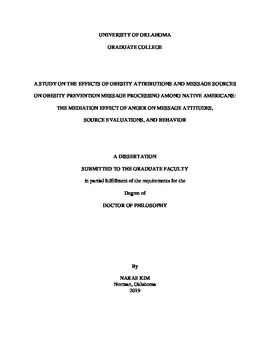| dc.description.abstract | The main purpose of this study was to design and test the effects of obesity prevention messages that specifically targeted Native American adults. The message features on which this study focused to design obesity precention messages were obesity attributions and message sources of criticisms. Based on attribution theories (Johes & Nisbette, 1972; Kelly, 1976; Weiner, 1985, 1986) and the intergroup sensitivity effect (Hornsey & Imani, 2004), varying levels of anger about obesity prevention messages and message processing outcomes (attitudes toward messages, source evaluations, and behavioral intentions) because of obesity attribution types, message sources, or both among Native American study participants were proposed. The anger Native Americans experienced regarding types of obesity attributions and message sources were treated as mediating variables in this study, which influenced subsequent message processing outcomes, including message attitudes, source evaluations, and intentions to accept the recommendation. The cognitive-functional model (Nabi, 1999, 2002) and the anger activism model (Turner, 2007) guided the study to predict roles of anger in health message processing. All these predictions that focus on Native Americans’ obesity prevention message processing were revisited based on the effects of targeted messages.
A 2 (obesity attributions: internal/external) × 2 (source of criticism: Native Americans/non- Native Americans) × 2 (message recipients: Native Americans /non- Native Americans) × 2 (Message replication: a total number of messages that each participant was exposed) mixed design employed to test 16 research hypotheses. Twelve printed public service announcements were created (three message sources for each of two source types × three obesity attributions for each of the two attribution types). A total of 118 Native American members of the Cheyenne and Arapaho Tribes in Oklahoma were recruited during several community festivals from August 16 to September 1, 2019. Non-Native American participants (N = 129) were recruited via an online study panel website from September 30 to November 1, 2019. Participants were randomly assigned to one of the message source conditions and then read two messages: One message had internal attribution and the other had external attribution.
Findings showed that message source’s ethnicity was a significant message factor. As the study predicted, Native American participants reported 1) lower levels of anger about Native American message sources, 2) more positive message attitudes, and 3) more positive message source evaluations when message sources were Native American doctors than non-Native Americans. The study also found that lower levels of anger experience facilitated positive message attitudes and source evaluations by mediating message sources’ influences.
Interactions between obesity attributions and message sources’ influenced on Native Americans point to Native Americans experiencing varying degrees of anger on message sources. The most intense anger was reported from participants who were in a non-Native American message sources and internal attributions message condition, whereas participants showed lower levels of anger about messages when they read messages delivered by Native American doctors, and they stated either internal or external obesity attributes. Relatively lower levels of anger caused by a combination of obesity attribution types and Native American doctors also led to more positive message attitudes and source evaluations. Last, outcomes of testing targeted messages revealed that matching between message sources and recipients’ ethnicities were the key factors for enhancing the targeted message’s effect. Participants expressed lower levels of anger and showed positive attitudes toward messages and source evaluations when they read messages that were delivered via message sources sharing the same ethnicity with them.
This study’s outcomes contributed significant insights into Native Americans’
responses to obesity prevention health messaging. By identifying a message factor that may facilitate effective obesity prevention message processing outcomes, the study provided empirical evidence for theoretical propositions associated with emotional, attitudinal, cognitive, and behavioral responses to obesity prevention messaging. Moreover, outcomes can be utilized for designing actual obesity prevention messages that lead to desirable outcomes for Cheyenne and Arapaho Tribes. Implications, limitations, and suggestions for future research were discussed based on theories and the study’s context.
Keywords: Native American obesity, obesity prevention campaign, obesity attributions, message source effects, anger appeal, attribution theories, intergroup sensitivity effects, cognitive functional model, anger activism model, historical trauma, targeted health messages. | en_US |
